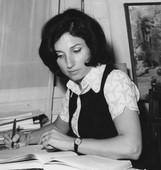Receive Our Newsletter
For news of readings, events and new titles.

Khalida Said is a foremost literary critic in the Arab world. Born in Latakia, Syria, after high school she studied at the School of Industry – the art of decorating, burning and engraving wood and copper, as well as glass painting. She moved on to the Teachers’ Training Institute, but continued to draw and paint in Damascus and was apprenticed to two of the Levant’s best-known artists: Nasir Shura and Mahmoud Jalal. She studied Arabic literature in Damascus and at the Lebanese University in Beirut and has a PhD in Arabic literature from the Sorbonne, France. She met her future husband Adonis, already a poet, in Damascus in 1950. In her interview in Banipal 74 she mentions how her father bought her books, saying: “On my life’s horizon, all I see is knowledge. Credit for this goes to my father, who raised me on this mentality. My father held knowledge to be sacred, and he believed that women are important and should be educated.”
Khalida Said moved with Adonis to Beirut in late 1956, where she found Lebanon to be “a paradise of freedom and knowledge”. Her first works were articles in Shi‘r magazine on the poetry of Adonis, of Nazik Al-Mala’ika, Fadwa Tuqan, Mohammad al-Maghut, and Ounsi El Hage. In the first issues she wrote under the pen name of Khuzama Sabri and then under her own when she became known.
She has published many books of criticism, including Yutubiya al-Madina al-Muthaqqafa (Utopia of the cultured city), dedicated to the city of Beirut. A book she is working on presently, Sirr al-Ma‘na (The Secret of Signification], includes studies on different poets, including Badr Shakir al-Sayyab (1926-1964), Gibran Khalil Gibran (1883-1931), Adonis and and her sister the poet Saniya Salih (1935-1985).
Her encyclopedic work, al-Haraka al-Masrahiya fi Lubnan ([The Theatre Movement in Lebanon,] 1998) is almost the only reference for reading the true history of Lebanese theatre. Another recent book is Fi-l Bid’ Kan al-Muthanna [In the Beginning was the Dual] (Saqi Books, 2009), in which she discusses creative Arab women in fields as diverse as poetry, the novel, literary criticism, painting, and sculpture.
Other works include: al-Bahth ‘An al-Juthour [The Quest for Roots], Sh‘ir Magazine Press, Beirut, 1960. The titles of her latest books, Faidh al-Ma‘na [The Overflow of Signification], Jurh al-Ma‘na [The Wound of Signification], and Ufuq al-Ma‘na [The Horizon of Signification], demonstrate her concern with the meanings and horizons of the poems she is analyzing.
Contributor's Issues
Banipal 74 - Celebrating Khalida Said and Modern Arabic Poetry (Summer 2022)